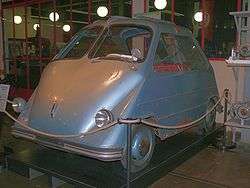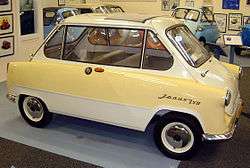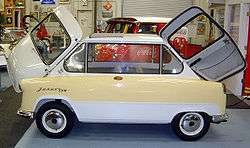Zündapp Janus
The Zündapp Janus was a microcar model made by Zündapp in Germany between 1957 and 1958, the only car ever built by the company.
Dornier Delta

Claude Dornier was always trying to minimize the dependency of his company Dornier Flugzeugwerke on building aircraft, by diversification into other areas. After World War II, and the Allied ban on aircraft production in Germany until the late 1950s, Claude diversified the company's production and encouraged his son Claudius to find new areas. As a result, Claudius designed and developed a four-seater car, where the two front and two rear passengers sat back to back, for optimal use of the enclosed space. A prototype was built and tested, which was named Dornier Delta. The company had not built a car before, and economic calculations showed that the volume of sales required would make it uneconomical for the company to make the car using its existing facilities.
Zündapp was a motorcycle maker, but in 1954 decided to make a more weatherproof vehicle. They looked for partners who could design such a vehicle, and approached Kroboth, Brütsch, and Fuldamobil before settling on the ready-developed vehicle from Dornier.
Zündapp Janus


Under a commercial agreement, Dornier licensed Zündapp to produce and market the car. Further developed using Zündapp's engineering input and envisaged as a "quality bubble car", the novel developed design featured a front-opening door for access to the front seat, as well as a rear-opening door for access to the rear-facing rear seat. This "coming or going" design was given the name of the Roman god, Janus, usually pictured having two faces: one looks forward while the other one looks back. The car was powered by a mid-mounted two-stroke, single-cylinder, 245 cubic centimetres (15.0 cu in) engine unique to the Janus, developing 14 hp (10 kW), enabling a top speed of 80 km/h (50 mph). The front suspension was of the leading arm-type that proved to be very comfortable, in the rear the car had a swing axle[1][2][3] and then the company added four individually mounted ventilated brake drums, operated via hydraulics.
Production started in June 1957. However, whilst in racing and sports cars the mid-engine configuration leads to optimal car handling, the engine in the Janus was much lighter than the rear passengers, leading to a variable centre of gravity. Secondly, the car lacked the most modern elements seen on competitors’ cars, and was not low priced. These factors combined to result in a lack of sales success, with only 1,731 cars being made in the first six months. By mid-1958, having made only a total of 6,902 cars, Zündapp abandoned the project and sold the factory to Bosch.
In popular culture
In the animated feature film Cars 2, Professor Zündapp is based on a 1957 Zündapp Janus.[3]
Dornier Delta II
During the mid-1960s, Dornier developed the Delta II with Hymer AG. The vehicle could carry up to six passengers and offered two sleeping places for camping. The development never got beyond the prototype stage.
References
| Wikimedia Commons has media related to Zündapp Janus. |
- Taschen, Benedikt. Kleinwagen, Small Cars, Petites Voitures, 1994.
- https://www.kues-magazin.de/wordpress/wp-content/uploads/2017/07/Zu%CC%88ndapp-Janus-Ro%CC%88ntgenzeichnung.jpg X-ray drawing
- https://osthessen-news.de/n11570223/ludwigsau-oldtimertage-im-besengrund-mit-seltenem-janus-pkw-bei-der-ausstellung.html
- Roberts, Andrew (20 November 2011). "Classic Zundapp Janus". The Telegraph. Retrieved 23 December 2013.
The Janus was envisaged as a 'quality bubble car' and Jim Hacking, a microcar expert and proud Zundapp owner, bristles with annoyance at the 2008 Time magazine article claiming that the Zundapp was one of the 50 worst cars of all time.